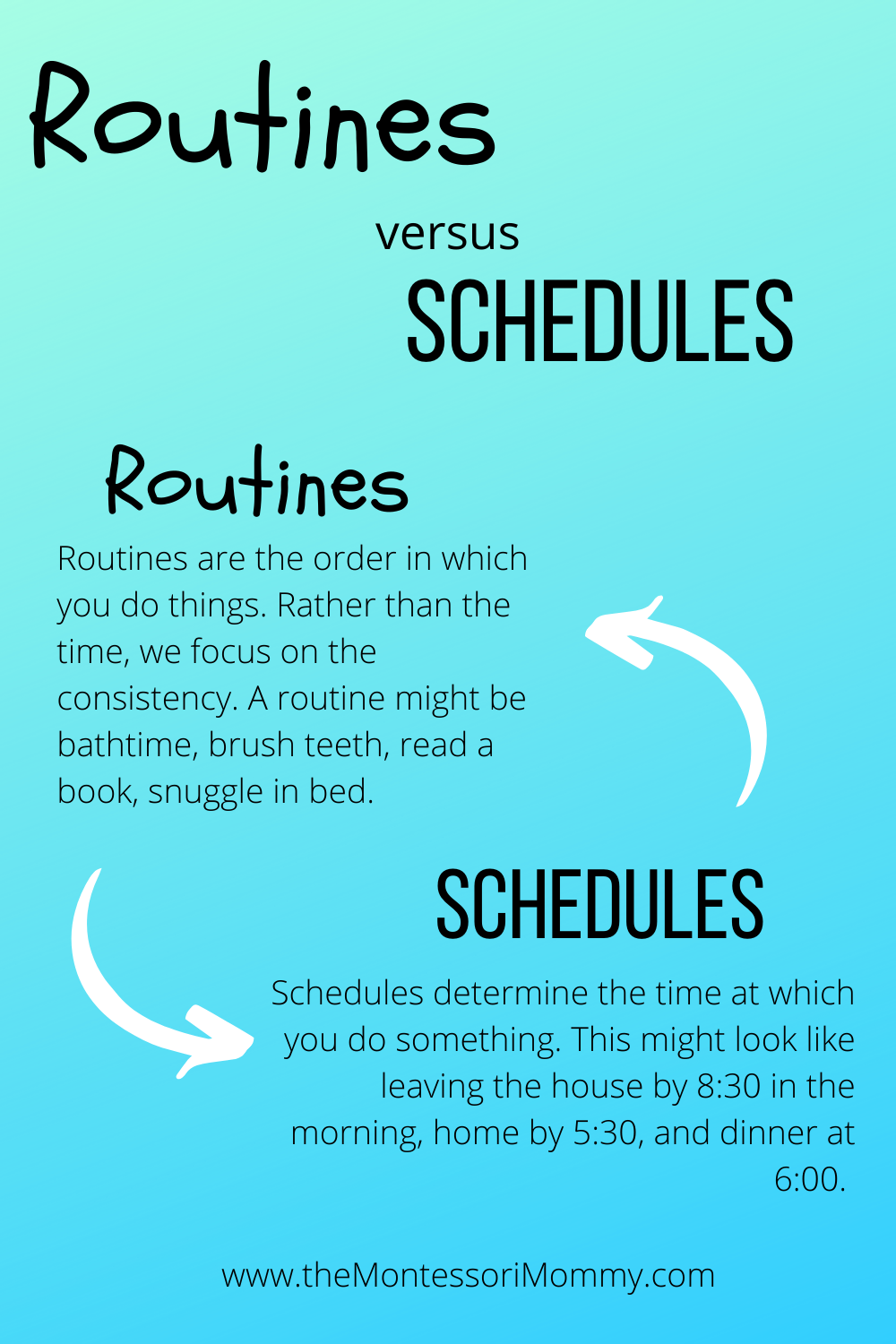Children, Schedules, and Routines – Oh my!

Routine. Schedule. We often use these words interchangeably. In many cases, they can be used interchangeably. It’s easy to find posts on different people’s suggested routines and schedules. As a stay-at-home mom, I love having a schedule to follow. It keeps me on my toes. For my kids, routines save the day. Or night.
What’s the Difference?

Simply put, schedules tell you when you do things and routines are how you do things. A schedule will look like a list of things you do attached to a time. Wake up at 6:00, out the door by 8, lunch at 12, home at 6, dinner at 7.
A routine tells us in what order we do things and often fills in blanks within a schedule. First you do this, then you do that. When you wake up, put your slippers on, brush your teeth, pull your hair back, and grab a cup of coffee, and browse news articles. A routine may not seem like a big deal, and you may not even think about it while it’s happening. Sometimes we never even think about it, such as when you brush your teeth: grab the toothbrush, then the toothpaste. Wet the brush and and add the toothpaste. You may not even be thinking about each of these things while you do it.
What do children need?
In my own experiences as a caregiver, teacher, and parent, I have to say routines rule the day. Young children, especially, crave consistency (sensitive period for order!) and predictability. While creating a routine and sticking to it may be difficult, once the routine is established, it makes things run like clockwork. Suddenly you’ll find your child automatically hanging her jacket up when she comes in and getting ready for bed with almost no prompting. Everyone feels happier and more relaxed.
Schedules can be useful, but I have found it often causes stress for parents. The biggest reason? Children do not understand how time passes yet, let alone how to tell time. Some parents have chosen, or been encouraged, to keep a rigid schedule for their children. On the one hand, this will create a routine and make life predictable for the child. On the other, life often does not follow our set schedules. Maybe your child sleeps in and throws the time off the schedule. Or maybe you have decided snack is at 9:30, but your child is not hungry at that time today.
In my experience, schedules work best when used as guidelines to help adults keep on track. For example, we start school at 9. This gives my kids plenty of time to eat, get dressed, and play before school. But sometimes we start around 8:30 and other times we start at 9:30.
Creating a Routine at Home
The best routines are the simple ones. An easy morning routine is wake up, diaper/potty, breakfast, clothes, brush teeth. At bedtime, we normally have dinner, clean up, shower, brush teeth, get jammies on, and read in bed. Most nights, there is very little argument about what needs to happen.
I also like to look at the whole day. Again, I don’t have a set time most of these things happen, but generally this is our day:
- Breakfast
- Get ready for the day
- Free play, indoor or outdoor
- School time
- Lunch
- Outdoor play
- Reading or TV
- Indoor play
- Dinner
- Bed
Once you have decided what you feel will work best for you and your family, you have to be diligent in making it happen. Do you want your child to hang his coat up as soon as he walks in the door? Every time he comes in, be there and remind him. Be kind and firm. Model doing the same. If he starts to leave his coat on the floor, let him know.
And sometimes, life gets in the way. You have a few kids, one kid left their coat on the floor while you were helping someone else, the dog is begging for attention, and something has just spilled on the floor. If it is my toddler’s coat on the floor, I often just hang it up for them. For a toddler, the moment has passed and their attention is elsewhere. If it is my older daughter’s coat on the floor, I have her come back and hang it up.
What routines or schedules have helped your family?


